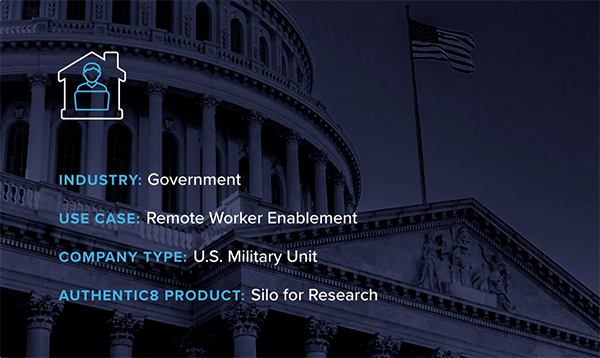Navy Cyber Defense Operations Command turns telework directives into an opportunity for improving security
The COVID-19 outbreak falls into the category of special circumstances. Incidentally, life in the Department of Defense (DoD) is filled with special circumstances. By the same token, there are populations within the DoD that are considered unique because of the mission they execute, the spotlight they are under, or the position that they hold. These special circumstances and extraordinary users deserve more than standard solutions, and they are taking matters into their own hands.
Inspired mainly by the COVID-19 pandemic, one of the functional combatant commands (COCOM), Navy Cyber Defense Operations Command (NCDOC), and one of the Service Cyber Components (SCC) turned social distancing and telework directives into opportunity. They are making security, scalability and enduring capability their priorities.
Each of these organizations has long been committed to taking quick, responsible actions. Each needed a rapidly deployable, easy-to-use solution to enable reliable, secure and audited remote work. Still, procurement could not scale fast enough to give each remote worker a fully secured, government-issued laptop. Even so, they understood the vital role that Bring-Your-Own-Device (BYOD) models play in digital strategies across the most successful commercial organizations. Furthermore, they knew that VPNs could not protect sensitive government information accessed from personal devices, nor could they enforce restrictions on uploads, downloads or local file storage. While a VPN-centric solution can secure the network connection, it does not address any cybersecurity, operational security and insider threat risks – risks that special operators, cybersecurity professionals and senior leaders were unwilling to accept.
Secure Browsing prevents highly targeted senior leaders from falling victim to spear-phishing campaigns, which Air Force Lt. Gen. Bradford Shwedo, Joint Staff CIO, has acknowledged are surging during the COVID-19 pandemic. Silo is affording network administrators the ability to avert insider threats through careful policy enforcement, activity logging and auditing capability. It enables all users to securely access critical business applications, CAC-enabled sites, and potentially dangerous sites via a familiar user experience. Authentic8 partnered with these discriminating organizations to immediately deploy remote work capability to their users in a secure manner, while isolating work data from untrusted devices and networks and enforcing security and compliance policies.
How web isolation with Silo works
Secure Browsing is built on Authentic8’s patented, cloud-based Silo Web Isolation Platform, which executes all web code in a secure, isolated environment. Managed by policy, it provides protection and oversight of all web-based activity. Security, identity and data policies are embedded directly into the browser, giving IT complete control over how internal users access the web, and how external users access internal web applications.
Today, the world’s most at-risk organizations and individuals rely on Silo to deliver trust where it otherwise cannot otherwise be guaranteed.
“We have long been using Silo as our platform of choice to conduct sensitive online missions; and given the growing need to work remotely, it was the obvious solution, much better than what is being made available to the masses.”
- COCOM, Chief of OSINT and PAISecure Browsing earns high praise from higher-ups
Upon successful deployment and given the growing need for remote work, Captain Harold “Hal” Cole, Commanding Officer of NCDOC, encouraged his entire command to download Silo on their home computers and log in with work credentials.
In his words, “It’s the fastest, most responsible way to access CAC-enabled government sites without bringing data onto their personal devices.” Each of his cybersecurity professionals is now splitting time between working remotely and in the office. No matter the location, Silo remains their portal to productivity and means of mission execution. Both the COCOM and SCC are leveraging the platform in similar fashions consistent with their policies.
As the COCOM’s Chief of Open Source Intelligence and Publicly Available Information stated, “We have long been using Silo as our platform of choice to conduct sensitive online missions, and given the growing need to work remotely it was the obvious solution, much better than what is being made available to the masses.”



